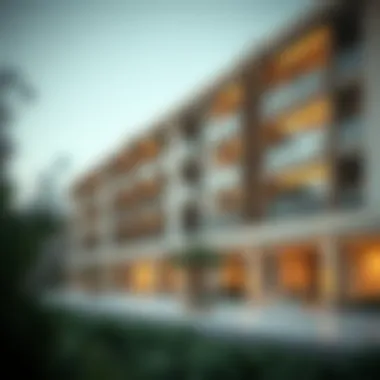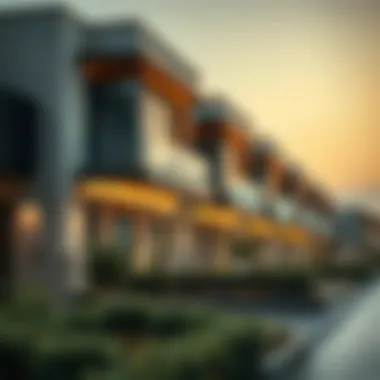Exploring Dubai's Residential Property Landscape


Intro
Navigating the bustling real estate market in Dubai can feel like stepping into a vast, shifting desert landscape. With its rapid development and evolving buyer preferences, understanding residential properties in this Emirate calls for more than just a cursory glance. As investors and home buyers embark on their journey, they find themselves amidst a plethora of options, from swanky downtown apartments with stunning views of the Burj Khalifa to charming villas nestled in serene communities.
In the following sections, we will dissect the current trends shaping Dubai's residential properties. We will explore what keeps the market ticking, boast various property types available, and guide you through essential financial considerations. By piecing together this intricate puzzle, we aim to equip you with the insights necessary for making informed decisions in the complex world of property ownership and investment.
Let's kick things off by examining the pulse of this dynamic market in the next section.
Market Trends
Current Market Analysis
Dubai's residential market has steadily gained momentum, driven by factors such as improved economic conditions, government regulations, and a growing population. Buyers are showing an increased appetite for properties in emerging neighborhoods, where value for money is perceived to be higher compared to traditional hubs. Popular areas like Dubai Marina and Downtown Dubai retain their allure, yet places like Jumeirah Village Circle (JVC) and Mohammed Bin Rashid City are blossoming.
A key trend right now is the high demand for off-plan properties, fueled by attractive payment plans and a desire for modern living spaces. Investors are keen on snagging deals before prices soar. This is particularly evident as many developers offer flexible financial packages, such as the 50/50 payment plans, allowing homeowners to secure their investment and enjoy their properties simultaneously.
Future Projections
Looking ahead, projections suggest a continued upward trajectory in the residential market. Experts anticipate a rise in property values fueled by ongoing infrastructure improvements and significant projects like the Expo 2020 legacy developments, which are set to enhance the appeal of residential neighborhoods. The expectation of rising yields may make investing in Dubai properties even more attractive as buyers seek long-term gain.
"The UAE's residential market has proven resilient, adapting to global challenges and local demands."
Keeping an eye on international trends can also yield insights; for example, the increasing interest from foreign investors looking for second homes or vacation rentals will likely impact supply dynamics. It’s crucial for potential buyers and investors to remain vigilant and engaged in market updates to capitalize on these changes effectively.
Property Insights
Neighborhood Comparisons
The choice of neighborhood is pivotal when investing in residential properties. Each area has its unique offerings and caters to different buyer demographics. For instance, families often favor neighborhoods like Arabian Ranches or The Springs due to their family-friendly environment and extensive amenities.
Here’s a quick comparison of notable neighborhoods:
- Dubai Marina: Known for its waterfront living, vibrant nightlife, and lush promenades.
- Downtown Dubai: Home to the Burj Khalifa and vibrant retail and dining experiences, perfect for those who thrive in a bustling urban environment.
- Jumeirah Village Circle (JVC): A favorite among budget-conscious buyers, known for spacious properties and a sense of community.
Property Types Explained
Understanding the types of residential properties available is crucial. Here’s a breakdown of some common categories:
- Apartments: Popular among investors and first-time buyers; they come in various scales, from luxury to affordable options.
- Villas: Often sought after by families, these provide larger living spaces and gardens, contributing to a suburban feel in urban settings.
- Townhouses: These hybrid options offer a blend of both apartments and villas, appealing to buyers looking for community vibes without sacrificing space.
In light of these insights, potential buyers are encouraged to weigh their choices carefully, considering both their personal needs and investment goals. This understanding will serve as a foundation for embarking on a successful property acquisition journey in Dubai's vibrant market.
For further reading, you might find these resources helpful:
By comprehensively understanding these areas, both homebuyers and investors can position themselves advantageously within Dubai's real estate landscape.
Overview of Residential Properties in Dubai
Residential properties in Dubai represent a significant facet of the emirate's vibrant real estate landscape, characterized by variety and dynamism. This section aims to provide a foundational understanding for potential buyers, investors, and other stakeholders looking to navigate this complex market. By exploring the different types of residential properties available, we can glean insights into their relevance, investment potential, and their role in shaping the urban fabric of Dubai.
Definition and Types of Residential Properties
Understanding the diverse types of residential properties is crucial, as each category serves unique demographics, lifestyle needs, and investment objectives. The offerings include luxury villas, apartment complexes, townhouses, and shared ownership models. This variety not only enriches the market but also caters to a broad spectrum of preferences and financial capabilities.
Luxury Villas
Luxury villas in Dubai are the epitome of opulence and exclusivity. With spacious layouts and high-end finishes, these homes cater to affluent buyers seeking comfort and status. The prime locations, often in gated communities, offer serene environments complemented by top-tier amenities such as private pools and landscaped gardens. One key characteristic of luxury villas is their architectural diversity, offering designs ranging from contemporary to classical. However, owning a villa can come with hefty maintenance costs and a more extensive commitment in terms of property management.
Apartment Complexes
Apartment complexes represent a significant portion of the residential market, appealing mainly to busy professionals and families. These multi-unit buildings boast a range of amenities, from gyms to communal pools, fostering a sense of community. The key characteristic of apartment complexes is their affordability compared to standalone houses. Although purchasing an apartment often means dealing with homeowners' associations, the benefits include lower entry costs and access to shared facilities, making them an attractive option for many.
Townhouses
Townhouses sit perfectly between villas and apartments, often featuring two or three stories with shared walls. They cater to buyers who desire a sense of community without sacrificing valuable space. One attractive feature of townhouses is their garden space and sometimes private parking, blending the convenience of apartment living with the freedom of a standalone house. However, potential owners should carefully consider the shared responsibilities and potential restrictions that come with living in a community.
Shared Ownership Models
The concept of shared ownership models has gained traction in Dubai, enabling buyers to invest in high-value properties at a fraction of the full cost. These models allow individuals to purchase a percentage of a property, making ownership more accessible. The unique feature is that it removes some financial barriers, allowing more people to tap into the property market. On the flip side, shared ownership can complicate decisions related to property management and profit distribution during resale.
Importance of Residential Properties
The significance of residential properties extends beyond mere shelter; they play a pivotal role in the economic and social fabric of Dubai.
Contribution to the Economy


Residential properties act as a major economic driver in Dubai. The sector creates jobs, both directly and indirectly, contributing to revenue through property taxes and boosting ancillary industries. Construction, maintenance, and property management services flourish due to the demand for residential projects. Notably, the real estate sector thrives on foreign investments, harnessing global capital that stimulates local markets and enhances overall economic resilience.
Social Implications
Residential properties impact social dynamics significantly. They serve as the backdrop for diverse communities, fostering social interactions and cultural exchanges. The availability of a range of properties allows for a melting pot of residents from different backgrounds, enhancing the multicultural tapestry of Dubai. On the downside, rapid development pressure can lead to issues such as overcrowding or displacement, which need careful consideration.
Urban Development Strategy
The urban development strategy of Dubai heavily relies on residential property development. By prioritizing sustainable and integrated residential communities, the city aims to create environments that enhance quality of life. Strategic planning ensures that new developments cater to future population growth, incorporate green spaces, and provide essential services, although it can be challenging to balance rapid growth with sustainability.
In summation, delving into the world of residential properties in Dubai reveals a multifaceted landscape essential for understanding the broader real estate market. Recognizing the types, their implications, and contributions engraves a clearer picture for any involved parties seeking to make informed decisions.
Market Trends in Dubai's Residential Sector
The residential property market in Dubai is a whirlwind of activity. For anyone considering buying or investing in properties, understanding these trends is crucial. They can shape your decisions and influence your potential returns. These market trends not only reflect current conditions but also provide insights into future opportunities as the city evolves.
Current Market Conditions
Price Dynamics
Looking at price dynamics in Dubai's residential sector offers a glimpse into how the market is performing at any given time. A key characteristic of the price dynamics hinges on its fluctuation, which is influenced by a variety of factors such as location, demand, and economic conditions.
The trend of property prices generally shows an upward trajectory, but there are periodic corrections that present lucrative buying opportunities. Understanding the pricing cycles can empower investors and buyers.
It's important to note the unique feature of the pricing structure in Dubai; it tends to have sharp increases in desirable areas followed by corrections elsewhere. This contrast makes it beneficial for savvy buyers who can identify under-valued properties. However, one must also be wary of overpriced units, which could lead to a financial pickle down the road.
Demand vs Supply
Demand versus supply is a fundamental pillar when considering investment or purchasing in Dubai's real estate. Demand is typically driven by the influx of expatriates and investors alike, eager for the luxuries the city has to offer. When demand surpasses supply, prices naturally rise, which translates to better returns for investors.
One key characteristic to watch is the upcoming developments that are bound to affect both the demand and supply spectrums. High construction activity often indicates a strong supply side, but if demand remains robust, any oversupply could be quickly absorbed.
The unique challenge here lies in timing. Investors must gauge when to jump in before prices soar or when to step back if the market shifts towards oversupply, which can curtail potential returns.
Foreign Investment Patterns
Another noteworthy aspect is foreign investment patterns in Dubai. The emirate attracts a significant number of international buyers who are often seeking not just homes, but investment opportunities. This active foreign participation characterizes the market as global rather than merely local.
The beneficial element of this trend is the influx of liquidity that foreign buyers bring, enhancing property values. However, certain unique features, such as shifts in foreign investment policies or geopolitical changes, can also create unpredictable turbulence in the market.
For example, changes in visa laws aimed at long-term residency for investors could substantially increase foreign interest. However, fluctuating oil prices or regional stability issues might dissuade foreign money from flowing in at certain times, highlighting the need for constant awareness.
Emerging Neighborhoods
Trends in Location Preferences
As Dubai continues to grow, location preferences are rapidly evolving. More buyers are now leaning toward neighborhoods that offer green spaces, community vibes, and accessibility to services as they balance work and leisure.
One beneficial aspect of these trends is that emerging suburbs can often be more affordable than established areas, giving buyers a chance to invest in properties poised for value appreciation. A unique feature in this context is the shift towards suburban living; families or individuals working from home increasingly seek out larger spaces, moving away from high-density urban centers.
Adapting to these preferences can yield significant advantages, yet one must remain cautious of the long-term viability of these neighborhoods as future developments can also affect property values.
Impact of Developments on Property Values
New developments can be double-edged swords impacting property values significantly. On one hand, they can enhance the desirability of an area; on the other, they can lead to oversupply. When a new community is built, it usually attracts attention benefiting existing properties as well.
A crucial characteristic to consider is how community features such as schools or recreational areas can elevate property values over time. On the downside, if developments are poorly planned or excessively high, they may lead to market saturation, which can dampen returns.
Promising Areas for Investment
When diving into Dubai's real estate, identifying promising areas for investment is akin to striking gold. Neighborhoods such as Dubai Marina and Downtown Dubai initially steal the limelight, but areas like Al Furjan and Dubai Hills are quick becoming sought-after gems.
The sheer benefit of investing in these upcoming areas lies in their potential for growth at comparatively lower entry prices. However, the unique challenge one faces is predicting how these areas will evolve in terms of infrastructure and amenities.
Keeping a pulse on development plans and urban expansion can be the linchpin to successful investments. As these neighborhoods flourish, so will property values, but timing your entry remains key.
In an ever-shifting landscape, staying informed on market trends is the cornerstone of navigating Dubai's dynamic residential sector.
Navigating the Buying Process
Navigating the buying process in Dubai's residential property market may feel like a daunting task, especially for first-timers. However, understanding the intricacies involved can lead to smoother transactions and better investment outcomes. Whether purchasing a luxury villa or a compact apartment, being well-acquainted with the buying process is essential to making informed decisions. This segment outlines the legal framework and financing opportunities essential for prospective buyers.
Understanding Legal Frameworks
Title Deeds and Ownership Laws
When considering real estate in Dubai, title deeds and ownership laws become pivotal. These documents serve as proof of property ownership, establishing who holds the rights. The system operates under a straightforward framework, where properties are registered with the Dubai Land Department. A key characteristic of title deeds in Dubai is that they are linked to a freehold system, which allows foreign investors to acquire residential property without constraints on ownership duration. This feature has rendered Dubai an attractive location for international investors, contributing significantly to the local economy.
Nonetheless, buyers should be aware that there are certain obligations tied to ownership, such as annual maintenance fees and potential property taxes.


Regulations for Foreign Buyers
The rules governing foreign buyers are also important to consider. Dubai's government has implemented a friendly policy towards non-residents, allowing them to purchase in specific zones without the usual restrictions found in other countries. The regulations often provide ease of access; however, it is advisable to examine the specifics regarding leasehold vs. freehold ownership. Many foreign buyers find this an appealing aspect, creating a more straightforward entry into the market than in many other global hotspots.
Although the process is relatively smooth, potential challenges do exist, like varying rights attached to different property types. Being informed about these regulations helps mitigate risks associated with property acquisition.
Property Registration Process
The property registration process involves several steps, including documentation, payment of fees, and obtaining the necessary approvals. Buyers must first secure a no-objection certificate from the developer, after which they can initiate registration at the Dubai Land Department. One notable characteristic of the registration process is its transparency; it ensures both parties adhere to the agreement’s conditions and protects their interests.
This straightforward step is beneficial for buyers, providing them with legal protection and a clear path of recourse in case of disputes. Nonetheless, it usually incurs associated costs, including a registration fee, which varies based on the property's value. This can often be a surprise for buyers, especially those unprepared for additional expenses.
Financing Residential Properties
Mortgage Options
Exploring mortgage options is critical during the buying process. In Dubai, several banks offer financing solutions tailored to residential properties. This not only broadens access to housing but also helps buyers manage their cash flow better. A significant advantage is the competitive interest rates available, which makes home buying more feasible for many.
However, it's worth noting that lenders often assess the borrower’s financial history rigorously, and failure to meet criteria could delay or deny loan approvals.
Government Schemes for Buyers
The government has rolled out various schemes aimed at supporting buyers, especially first-time purchasers. These schemes often provide favorable terms, including lower deposit requirements and extended repayment periods. They have also introduced initiatives like the Dubai Housing Programme designed to stimulate homeownership. Such schemes make property acquisition more attainable for both residents and foreign investors.
Despite their advantages, buyers must ensure they fully understand the terms and conditions, as some schemes have limitations that could affect their long-term financial plans.
Interest Rates and Affordability
While considering investment opportunities, the fluctuation of interest rates is a noteworthy aspect. Mortgage lenders frequently adjust interest rates depending on market conditions. With the current global economic climate being unpredictable, buyers need to be keenly aware of how these changes could impact affordability.
Realistically evaluating personal finances and understanding borrowing expenses helps prevent potential pitfalls down the line. Buyers should strive to seek professional advice to make well-informed choices that align with their financial capabilities.
Important Note: Always opt to consult professionals, such as real estate agents and legal advisors, when navigating the buying process. Their expertise can significantly ease the journey.
Investing in Residential Properties
Investing in residential properties in Dubai represents a pivotal facet of the city’s flourishing real estate landscape. This segment of the market not only provides substantial returns but also offers a chance to become part of an ever-evolving community. The complexity of the market necessitates a clear understanding of various strategies and evaluations that blend economic insights with personal financial goals.
Successful investments hinge on informed choices regarding the approaches and potential outcomes to be expected. Understanding the nuances of the market can lead to profitable ventures and sustainable living options, making it a worthwhile endeavor for potential investors.
Investment Strategies and Approaches
Buy-to-Let Investments
Buy-to-let investments in Dubai have gained traction among both local and foreign investors. This strategy involves buying a property primarily to rent it out. The steady influx of expatriates and tourists in Dubai creates a constant demand for rental properties, offering a reliable income stream.
What makes buy-to-let appealing is the potential for greater cash flow, especially in well-located areas. However, investors should keep an eye on occupancy rates and market fluctuations that can affect rental income. Along with this, the legal frameworks surrounding renting must also be understood, as they can vary widely, impacting profitability.
While the prospect of consistent rental income is attractive, potential landlords should also consider maintenance costs and tenant management. Thus, analyzing both the advantages and disadvantages becomes crucial in this strategy.
Flipping Properties
Flipping properties, or buying and quickly reselling them for profit, can be an exhilarating investment approach. Investors identify undervalued properties, enhance their appeal through renovations, and then market them at a premium. This method has an enticing allure due to its potential for high short-term gains.
However, success in flipping demands a keen understanding of property values, renovation costs, and trends in buyer preferences. Misjudging any of these could lead to significant financial setbacks. Investors should also factor in market timing, as holding onto a property for too long could eat into profits.
Long-term vs Short-term Investments
The debate between long-term and short-term investments is a crucial consideration in the Dubai residential market. Long-term investments often yield stable returns through rentals or appreciation, while short-term investments like flipping focus on immediate profits.
Long-term strategies allow for a more measured approach to market fluctuations and economic cycles, while short-term investments can be lucrative in a rapidly changing market. Yet, short-term strategies come with risks; they require quick decision-making and market adaptability.
The key here is to align investment choices with personal financial situations and risk appetites, balancing immediate returns with long-term strategies. Each choice can have distinct advantages and disadvantages based on individual goals and market circumstances.
Evaluating Investment Potential
Analyzing Market Trends
Analyzing market trends is fundamental for any investor looking to grasp the pulse of the Dubai residential property scene. Understanding current trends, such as price fluctuations and buyer demographics, helps inform strategic decisions. Emerging areas and buyer preferences can indicate where investment dollars may yield the best results.
Utilizing market reports and analysis can reveal shifts in buyer confidence and property values. For example, a rise in population may point to an expanding market, while changes in legislation could create new opportunities or challenges for investors.
Risk Assessment
Risk assessment is vital in navigating the uncertainties of real estate investment. Evaluating potential risks—from market downturns to property-specific challenges—can significantly affect an investor's total ROI. Developing risk management strategies, such as diversifying portfolios, can help mitigate potential losses.
Investors should also keep an ear to the ground for global economic shifts that may reverberate through the Dubai market. Understanding the broader economic framework helps in preparing for unexpected changes.


Return on Investment Considerations
Return on investment (ROI) considerations are at the heart of every investment decision. Calculating ROI involves evaluating both current and potential future earnings against upfront costs. Additionally, understanding what factors—such as cash flow, appreciation, and tax implications—contribute positively or negatively to ROI can sharpen one's investment strategy.
Investors often use historical data to project potential returns, but it’s also important to focus on the dynamic nature of the market. This can include both economic indicators and local trends, allowing investors to adapt strategies accordingly.
By staying informed and employing a multifaceted approach, individuals can make calculated decisions that align with their financial aspirations in Dubai's ever-changing residential market.
Living in Dubai's Residential Properties
Living in Dubai offers a distinct blend of luxury and opportunity, especially within its residential properties. As the city continues to attract attention from around the globe, understanding the unique aspects of life here is crucial for homebuyers, investors, and renters alike. The essence of living in Dubai goes beyond mere accommodation; it's about embracing a lifestyle that combines modern amenities, cultural richness, and a vibrant community spirit.
Lifestyle and Amenities
Community Features
Community features play a significant role in shaping the living experience in Dubai's residential areas. These often include beautifully landscaped parks, swimming pools, and well-designed communal spaces that cater to a variety of social needs. Such features not only enhance the aesthetic value of neighborhoods but also promote a sense of belonging among residents. Many find that living in communities with these attributes fosters a sense of safety and social interaction, which is quite advantageous for families or individuals seeking a vibrant local life. However, it’s important to note that maintaining these features can sometimes lead to higher maintenance fees, affecting overall affordability.
Accessibility to Services
Accessibility to services is another hallmark of living in Dubai. From shopping malls and hospitals to schools and public transport, the proximity of essential services is a significant draw. This feature is particularly important for those who prefer a life where convenience is just around the corner. For instance, communities near major metro lines or bus stops allow for effortless commuting, making them highly appealing to professionals and families alike. The downside? In some bustling areas, this accessibility can come with traffic congestion during peak hours, a reality that anyone used to the pace of big cities may already be accustomed to.
Recreational Facilities
Recreational facilities are at the heart of many residential properties in Dubai, offering residents options for leisure and fitness. Gyms, sports courts, and children's play areas are common in many communities, providing opportunities for an active lifestyle. This aspect is vital for those who prioritize health and well-being, as it encourages outdoor activities and social interactions. However, while such facilities can be advantageous, their quality and the fees associated with accessing them can vary greatly from one community to another, sparking a range of preferences among potential residents.
Cultural and Social Dimensions
Integration into Local Communities
Integration into local communities is an important consideration for anyone moving to Dubai. The city’s diverse expat population means that many find themselves in dynamic neighborhoods where cultures collide and coexist. This integration fosters friendships and collaborative experiences that enrich lives. It’s also a significant factor when it comes to networking, both socially and professionally. The downside might be the challenge some face while trying to assimilate into the local customs and lifestyles, which can be complex given the cultural tapestry that Dubai represents.
Social Events and Networking Opportunities
Participating in social events and networking opportunities can greatly enhance the experience of living in Dubai. Many neighborhoods host events that celebrate various cultures, business expos, or even casual meetups at local cafes. These gatherings not only provide a platform for social interaction but also open doors for professional collaborations, which are golden opportunities in today's interconnected world. However, the fast-paced nature of life in Dubai can sometimes make it difficult for newcomers to break into social circles, presenting a challenge that many must navigate carefully.
Understanding Local Etiquette
Understanding local etiquette is paramount for those settling in Dubai. The city's blend of modernity and tradition requires awareness of both cultural norms and social expectations. This includes everything from greeting customs to dress codes during specific occasions. Embracing this knowledge not only helps in personal interactions but also cultivates respect within the community. Yet, the need to adjust to such standards can create initial discomfort for newcomers, underscoring the importance of education and observation in these early days of settling in.
Future Outlook for Residential Properties
Understanding the future landscape of residential properties in Dubai is crucial for investors and homebuyers alike. As Dubai continues to evolve as a global city, the dynamics affecting its property market undergo significant transformations. The trends and predictions outlined here will help stakeholders anticipate shifts in the market, facilitating informed investment decisions. This section delves into technological advancements and regulatory changes—two primary factors shaping the future of Dubai's residential properties.
Technological Advancements
Smart Home Integrations
Smart home technology is not just a buzzword anymore; it’s becoming a staple in residential offerings. Integrating smart technology into homes can greatly enhance the living experience. From smart thermostats to advanced security systems, these features allow residents to control their environment at the touch of a button.
One significant characteristic of smart home systems is their ability to improve energy efficiency. By automating heating, cooling, and lighting, homeowners can reduce energy consumption and save on utility bills. However, the initial costs of installation and potential technological obsolescence can be a hurdle for some buyers. Failing to keep up with rapid technology changes may leave certain homes outdated.
Sustainability in Residential Development
Sustainability is no longer an optional add-on; it is becoming a fundamental requirement in the residential property market. Many new developments in Dubai now emphasize eco-friendly materials and energy-efficient designs. Sustainable homes not only appeal to environmentally conscious buyers but are also seen as investments for the future.
A key feature here is the utilisation of renewable energy sources, such as solar panels, which can significantly lower lifetime energy costs. However, sustainable homes can sometimes carry a higher upfront cost, which may deter some potential buyers. Balancing these costs with long-term savings is essential.
Innovations in Property Management
Property management technology is making waves in Dubai's residential sector. Innovative solutions, like AI-driven property management software, can enhance efficiency in managing residential properties. These innovations streamline processes such as tenant communication, maintenance requests, and rent collection, allowing property managers to focus on strategic growth rather than day-to-day tasks.
Such advancements reduce operational hassles, making investment properties more attractive to potential buyers. However, there may be challenges related to the steep learning curve for managers not accustomed to high-tech solutions. Overall, these innovations can improve tenant satisfaction, leading to better retention rates and ultimately higher property values.
Regulatory Changes and Their Impact
Property Tax Reforms
Recent reforms in property tax policies can have substantial implications for the residential market. These reforms aim to create a more equitable taxation system that would offer relief for homeowners while still generating revenue for essential services. For instance, reducing property taxes could stimulate the market by making homeownership more accessible.
Importantly, potential buyers should stay informed about these changes as they can affect affordability and market sentiment. The uncertainty around tax policies might deter some investors from making quick decisions, necessitating a careful assessment.
Government Initiatives to Promote Investment
The local government plays an indispensable role in bolstering the residential property market through various initiatives designed to attract both local and foreign investments. Policies such as providing long-term residence visas for property investors aim to foster stability in the market.
Such initiatives not only promote immediate investment opportunities but also signal confidence in the long-term growth of Dubai's residential sector. However, a sudden influx of investment could lead to an oversupply of properties, which could, in turn, result in price corrections.
Future Land Use Policies
Future land use policies are set to influence development patterns across Dubai. These policies often focus on urban density, zoning regulations, and the use of green spaces. As Dubai continues to expand, the strategic planning of land resources will be essential to accommodate the growing population without compromising quality of life.
The characteristic advantage of forward-thinking land policies is that they can increase property values in well-planned areas. However, unclear or shifting policies can create instability and lead to challenges for developers and investors. A deep dive into land use planning can illuminate potential areas ripe for investment while navigating risks effectively.
The future of residential properties in Dubai appears bright but comes with its share of challenges and opportunities. Staying abreast of technological and regulatory changes can empower stakeholders to make informed decisions in this vibrant market.















